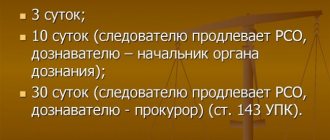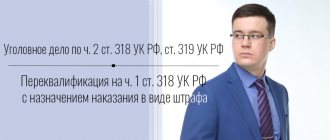If you've read (or watched) detective stories, you know that there can be multiple suspects during an investigation. And sometimes it turns out that there was no crime as such, and the investigation is stopped.
The same thing happens in real life. However, if you were detained, then the investigator had sufficient grounds to consider you involved in the commission of a crime. The grounds for detention are described in detail in one of our articles.
Even if you are innocent, you should not wait for the investigator to establish this, stop accusing you of a crime and let you go home.
Contact a criminal lawyer immediately, and he will likely be able to get you released from custody - at least until trial. Further, if possible, he will raise the question of either terminating the criminal case or mitigating the punishment.
Do you want to figure it out, but don’t have time to read the article? Lawyers will help
Entrust the task to professionals. Lawyers will complete the order at the cost you specify
27 lawyers on RTIGER.com can help with this issue
Solve the issue >
Can a theft case be closed before trial?
Art. 76 of the Criminal Code of the Russian Federation states that a criminal can be released from criminal liability in connection with reconciliation with the injured party. To do this, several conditions must be simultaneously met:
- the offender committed the crime for the first time;
- the act falls under minor or moderate gravity;
- The harm caused by the offender to the victim must be fully compensated.
Theft is qualified under Art. 158 of the Criminal Code of the Russian Federation. Part one of the said article establishes liability for crimes of minor gravity, part two - for acts of moderate gravity. Thus, it is possible to release the offender from criminal liability for theft.
In order to terminate a criminal case, an investigator (with the consent of the head of the investigative department) or an investigator (with the consent of the prosecutor) on the basis of a petition from the victim or his legal representative has the right to terminate a criminal case against a person suspected or accused of committing a crime under Part 1 or Part 2 of Article 158 of the Criminal Code of the Russian Federation in connection with the reconciliation of the parties, that is, if the criminal, for example, returned a stolen bicycle to you, and you no longer have material claims against it.
Note!
It will not be possible to simply withdraw a theft statement filed with the police, because Art. 158 of the Criminal Code of the Russian Federation is a matter of public prosecution, and a document can only be taken away in a case of private prosecution.
Essence and grounds for suspension
Sometimes during the trial of a case situations arise when the investigation must be stopped for a while due to certain circumstances. This is the suspension of criminal proceedings.
The main goal of this institution is to “freeze” the investigation period, as well as to protect the rights of the accused and prevent their unlawful conviction.
The Code of Criminal Procedure of the Russian Federation identifies the following grounds for suspending criminal proceedings:
- the accused person has not been identified;
- it disappeared from investigation/location unknown;
- this person does not have the opportunity to actually be present at the UD proceedings;
- serious temporary illness, confirmed by medical documents, in which the accused cannot be present during investigative actions.
There cannot be any other reasons for a break, since this list is exhaustive.
If there is at least one of these grounds, the investigator issues a resolution to suspend the criminal case, a copy of which is sent to the prosecutor's office for verification.
What to do if there are several suspects involved in the case, but there are grounds for suspension for only one? Then the investigator has the right to separate the case into a separate one and stop proceedings for a while, provided that this does not harm the overall investigation.
During the investigation, the suspension of the criminal case is possible for all reasons except the first.
In what cases is a criminal case closed?
Let's consider the main situations in which the proceedings may be terminated:
- on the basis of Art. 24 Code of Criminal Procedure of the Russian Federation. It states that the investigation can be terminated in the absence of an event or corpus delicti. Also, the investigation can be terminated if the statute of limitations for criminal prosecution has expired or in the event of the death of the perpetrator. The case will not continue in the absence of a statement from the victim;
- if, before the court verdict came into force, a new law came into force that repeals the decision. The process also stops if the criminal prosecution against all accused or suspects has been terminated;
- in Art. 25 of the Code of Criminal Procedure of the Russian Federation states that a criminal case of minor or moderate severity can be terminated in connection with the reconciliation of the parties. As mentioned above, for this the victim must write a statement with a corresponding request to the authorized government agency;
- on the basis of Art. 27 of the Code of Criminal Procedure of the Russian Federation, criminal prosecution may be terminated if it is established that the accused or suspected person is not related to this act. Also, the basis may be an act of amnesty or the presence of a court decision in relation to the perpetrator that has already entered into force in the same case;
- if the accused or suspect has not reached the age of criminal responsibility or is incompetent;
- in a court hearing on the basis of Art. 254 of the Code of Criminal Procedure of the Russian Federation, when the injured party refuses the accusation;
- due to the failure of the victim to appear without a valid reason (only in cases of a private nature).
Is it possible to resume a previously terminated criminal case?
If the victim does not agree with the court decision, he has the right to appeal it. To do this, you will have to go to a higher court. In order to appeal an earlier decision, the applicant will need to support his words with strong evidence, otherwise the claim will remain without consideration. For example, the plaintiff will have to prove the illegality of the judge’s actions, the absence of corpus delicti, ignoring evidence, etc. An experienced lawyer will help to correctly formulate claims in the case.
Also, the reopening of a discontinued case may be initiated by the investigative authorities. Most often this happens when new circumstances and evidence emerge.
Reconciliation
Reconciliation of the parties to crimes classified under Part 1 and Part 2 of the Criminal Code of the Russian Federation is possible at any stage of the criminal process: both during the inquiry (investigation) and during the trial of the case. However, as practice shows, the number of cases of termination of criminal cases at the pre-trial stages has been reduced to almost zero. For the most part, this is due to the fact that law enforcement agencies need good statistics on the referral of cases of solved crimes to court.
According to the requirements of the law, the injured party can file a petition to terminate the criminal prosecution of the accused. At the same time, she will need to justify her appeal: describe the amount of damage compensated, whether the offender made an apology, etc.
Let us highlight some key aspects of the reconciliation procedure in court:
- the victim submits a written statement directly to the judge, and a decision on it is made after examining all the materials of the case;
- the judge asks the participants in the process about the possibility of applying the provisions of Art. 25 of the Code of Criminal Procedure of the Russian Federation, including the accused. If the latter is against (this happens extremely rarely), the court agrees with his position and refuses reconciliation. The opinions of other participants are heard, but are not binding;
- the perpetrator is obliged to write a statement of agreement with the termination of the case due to reconciliation with the injured party, while a record of awareness with the consequences for him is mandatory.
Note!
A court decision to refuse to satisfy an application to terminate a criminal case in connection with the reconciliation of the parties or to satisfy it can be appealed within 10 days by all participants in the process: the defendant, the defense attorney, the state prosecutor, the victim.
How to terminate a criminal case
The method of termination of criminal proceedings depends on the grounds. The defendant's lawyer must do everything possible to obtain an acquittal for his client or resolve differences between the parties amicably. If it is not possible to acquit the defendant, the defense attorney petitions for a mitigation of the sentence. Subsequently, the verdict can be challenged in a higher court or wait for an amnesty.
In some cases, a citizen may be given the status of a suspect, despite the absence of a crime. Then it is necessary to write a complaint against the actions of the investigator who initiated the criminal case. The statement must refer to the lack of corpus delicti, pointing to specific legislative norms.
If it was not possible to establish justice during the preliminary investigation, the suspect will have to defend his rights in court. To do this, it is better to enlist the support of an experienced lawyer.
Drawing up a refusal
The law does not contain clear requirements for the form of an application for reconciliation of the parties. However, within the meaning of the provisions of the Criminal Code of the Russian Federation and the Code of Criminal Procedure of the Russian Federation, it must contain the following information:
- name of the judicial authority where the applicant applies;
- Full name, residential address, telephone number of the author of the petition, as well as status in the case: the victim or his representative;
- essence of the appeal: what the applicant is asking for (to terminate the criminal case on the grounds provided for in Article 25 of the Criminal Procedure Code of the Russian Federation and Article 76 of the Criminal Procedure Code of the Russian Federation).
- justification for the petition - that is, a description of how exactly the guilty party made amends for the harm to the victim (the stolen item was returned, monetary compensation was paid, etc.). There must also be a record that the applicant has no claims against the defendant;
- number, signature.
Procedure for termination of the case
Chapter 29 of the Criminal Procedure Code is devoted to the termination of criminal proceedings. It contains only three articles – 212, 213 and 214.
The criminal case is terminated by the investigator, who issues a corresponding resolution. In this resolution, he sets out all the important information about the case and the grounds for terminating the criminal case.
But it's not that simple. He sends a copy of the decision to the prosecutor (Part 1 of Article 213 of the Code of Criminal Procedure). And the prosecutor can cancel this decision (Part 1 of Article 214 of the Code of Criminal Procedure). And this again suggests that an experienced lawyer should be involved in your case.
It is important to know: the investigator himself will not terminate the criminal case. A detailed, professional and reasoned petition to terminate the criminal case will be required. It must be drafted and filed by our attorney.
Adviсe
If you find yourself the victim of a crime or, conversely, you have been charged with theft, the first thing you need to do is contact a professional lawyer for advice.
Many citizens suspected of crimes believe that if they are truly innocent, then they will not need the services of a lawyer. In fact, without the help of a specialist, it will be quite difficult to prove your non-involvement in the case. After all, when detained, a person is usually in a state of stress and can make a lot of mistakes, for example, signing a document without reading it.
First of all, you need to remember that you have the right:
- do not give any evidence against yourself;
- do not sign the protocol and other documents;
- do not provide evidence of your innocence, since proving guilt is the responsibility of law enforcement officers;
- use the help of a lawyer.
To protect yourself from arbitrariness and illegal accusations, you need to seek legal help as early as possible.
Why should you contact a lawyer?
By law, the investigator must investigate the case impartially, objectively and professionally. But in practice everything is completely different.
The investigator needs to submit the criminal case to the court. And what “quality” it will be is the tenth question, because without a lawyer the court will side with the investigator.
The courts believe the testimony of the police officers themselves unconditionally. The testimony of these employees is called “operational information”, this is the disguise. It is assumed that “operational information” is objective, and a conviction can be based on it.
The court does not want to believe the testimony of defense witnesses. The court believes that they are biased, they are at one with the defendant, etc.
Witnesses? Investigators have “regular” witnesses at the ready who will sign and confirm anything in court. These may be cadets from departmental universities. Of course, they are on the side of the investigator, because they themselves are future investigators.
In cases, for example, about drugs, drug addicts themselves can be witnesses, who thus ensure that the investigator does not touch them for the time being. What kind of termination of a criminal case is there? This is “-1 case” in statistics for the investigator.
Without the help of a lawyer, the investigator will drag the case to trial, even if it becomes obvious that the suspect is innocent. But in court, maybe the case will somehow slip through... Could the judge be indignant and send the case for further investigation? Maybe, of course. If a judge is a conscientious and competent person, such people will meet. But it's better to be safe.
It is important to know: the investigator needs good statistics, so criminal cases are carried out even if they should be terminated. It reaches the point of absurdity. The court believes the investigator more and more willingly than the defendant: one government agency treats another government agency with understanding. And the investigator has more experience in legal matters than the one who got into trouble. What can you do without a professional lawyer whose services you can get? Just go to jail.
Important to know: remember that a lawyer is the only person involved in the case who wants to protect you and knows how to do it. A lawyer knows how to achieve a truly independent examination. How to attract witnesses and force the investigator to take their testimony into account. How to prove your alibi.
Cases from court practice
- Citizen Smirnov was accused of causing minor harm to the health of citizen Sidorov under article number 115 of the Criminal Code of the Russian Federation. From the statement of the defense it became clear that these actions were due to self-defense. Citizen Sidorov was the first to use force, and Smirnov was forced to defend himself. Evidence and testimony of witnesses were the basis for dismissal of the criminal case.
- A criminal case was opened against the accused citizen Ivanov under article number 213 of the Criminal Code of the Russian Federation - hooliganism. According to the inquiry, he committed a violation of public order with the use of weapons. From the statement of the defense, the court learned that the accused did not have a weapon, and there were no signs of a violation of public order in his actions. All this was the reason for closing the case.







